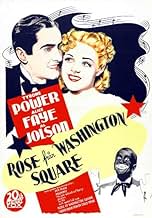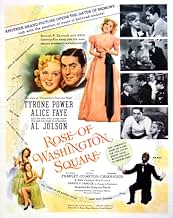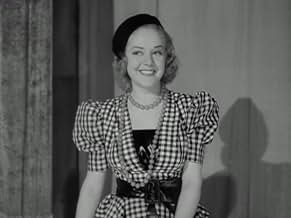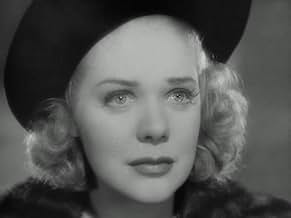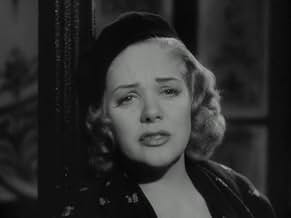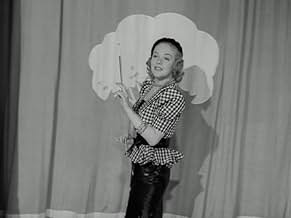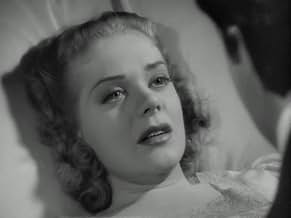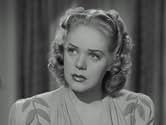अपनी भाषा में प्लॉट जोड़ेंA singer becomes a star in the Ziegfeld Follies, but her marriage to a con man has a bad effect on her career.A singer becomes a star in the Ziegfeld Follies, but her marriage to a con man has a bad effect on her career.A singer becomes a star in the Ziegfeld Follies, but her marriage to a con man has a bad effect on her career.
- निर्देशक
- लेखक
- स्टार
- पुरस्कार
- कुल 2 जीत
Paul E. Burns
- Chump
- (as Paul Burns)
Horace McMahon
- Irving
- (as Horace MacMahon)
फ़ीचर्ड समीक्षाएं
This is an excellent movie musical from the 20th Fox studio, which made excellent movie musicals. Fox made all those great musicals with John Payne and Alice Faye, until she got supplanted by Betty Grable. It's all here - storyline, music, production values and a Who's-Who cast of memorable character actors from the Golden Age of Hollywood.
"Rose" is actually a revue with only one or two songs written for the movie; "I Never Knew Heaven Could Speak" is one and is the best song in the picture. The rest are songs from pre and post WW1 and are old standards - there are 20 songs in all. Then there is the Cigarette Dance which contains some trick photography and is very clever indeed.
It stars Tyrone Power and Alice Faye who handle acting chores, but the singing duties belong to Al Jolson, who at one time was considered the best entertainer of the 20th century on either coast. He comes alive when he sings his signature numbers but has a very limited acting range. This picture is seldom seen today because, for reasons rooted in the early part of the last century, Jolson sang in blackface. Apparently this worked for him but the film is no longer in the good graces of the PC crowd and those intimidated by them. The plot is based (loosely) on Fanny Brice and her husband/problem child Nicky Arnstein. As we know too well, Hollywood feels fiction is stranger than truth and punches up many stories that were good to begin with. Plus, they were true, and what fun is that.
Do yourself a favor; if you can find this picture watch it and see how Hollywood used to do it in the good old days. As I stated in the summary, that's entertainment in the purest sense of the term. I gave it a well-deserved rating of 8.
"Rose" is actually a revue with only one or two songs written for the movie; "I Never Knew Heaven Could Speak" is one and is the best song in the picture. The rest are songs from pre and post WW1 and are old standards - there are 20 songs in all. Then there is the Cigarette Dance which contains some trick photography and is very clever indeed.
It stars Tyrone Power and Alice Faye who handle acting chores, but the singing duties belong to Al Jolson, who at one time was considered the best entertainer of the 20th century on either coast. He comes alive when he sings his signature numbers but has a very limited acting range. This picture is seldom seen today because, for reasons rooted in the early part of the last century, Jolson sang in blackface. Apparently this worked for him but the film is no longer in the good graces of the PC crowd and those intimidated by them. The plot is based (loosely) on Fanny Brice and her husband/problem child Nicky Arnstein. As we know too well, Hollywood feels fiction is stranger than truth and punches up many stories that were good to begin with. Plus, they were true, and what fun is that.
Do yourself a favor; if you can find this picture watch it and see how Hollywood used to do it in the good old days. As I stated in the summary, that's entertainment in the purest sense of the term. I gave it a well-deserved rating of 8.
If you liked Funny Girl, and what connoisseur of musicals didn't, you'll be interested to know it wasn't the first story inspired by Fanny Brice. Rose of Washington Square is a fictional-as advertised by the disclaimer in the credits-depiction of a Ziegfeld girl who falls in love with a gambler. Sound familiar? The names are totally different, so if you weren't looking for it, you might not immediately recognize the similarity to Funny Girl. Once Alice Faye started singing "My Man," hopefully you'd figure it out.
Tyrone Power plays the scoundrel, and he and Alice have as much sizzling chemistry as they always do in their movies together. Al Jolson, who spends more of his screen time in black face than out of it, plays Alice's devoted friend. Since this was the time period without video rentals, Al pleased audiences by repeating his signature numbers "Mammy" and "California Here I Come." In the story, Al's in love with her, but since he's up against Tyrone Power, he doesn't stand a chance. It's love at first sight for Ty and Alice, and even though he's no good, albeit incredibly shrewd, she can't let him go. Barbra Streisand couldn't let Omar Sharif go, could she? Make sure to go into this movie expecting a drama.
Tyrone Power plays the scoundrel, and he and Alice have as much sizzling chemistry as they always do in their movies together. Al Jolson, who spends more of his screen time in black face than out of it, plays Alice's devoted friend. Since this was the time period without video rentals, Al pleased audiences by repeating his signature numbers "Mammy" and "California Here I Come." In the story, Al's in love with her, but since he's up against Tyrone Power, he doesn't stand a chance. It's love at first sight for Ty and Alice, and even though he's no good, albeit incredibly shrewd, she can't let him go. Barbra Streisand couldn't let Omar Sharif go, could she? Make sure to go into this movie expecting a drama.
Despite this disclaimer at the beginning of "Rose of Washington Square," Fanny Brice realized the film was about her and quickly sued 20th Century Fox.
Gee, wonder what the kicker was...the good-looking con man husband who goes to jail on a bond fraud? The lead character headlining with the Ziegfield Follies? Or was it the song "My Man"?
Alice Faye is very pretty as Rose in this somewhat politically incorrect film which also stars Tyrone Power and Al Jolson: There's the man who is paid to drink so he can heckle Al Jolson as part of his act, and there's Al himself in blackface with white lips up on stage singing.
Nevertheless, the real story concerns the codependent relationship between Rose and Bart, her crooked husband. But it's Tyrone Power, and what woman wouldn't have loved him - in fact, what woman didn't love him in 1939? He was the number 2 box office star. He portrays the likable but sleazy character very well.
In the beginning of his career a few years earlier, he did romantic comedy, then did a string of films where he was a cad, then played soldiers, and after the war, did everything - he was a young man who found himself in "The Razor's Edge," played against type in "Nightmare Alley," and period-pieced his way through Fox until his contract finally ended. In 22 years as a star, he really did every genre, and did them beautifully.
There's lots of music in this movie and a HUGE build-up to the song "My Man" before Faye ever sings it. When she does, it's not the Streisand version, but rather a torch song, sung in Faye's low, rich voice.
Jolson was a terrific performer though apparently extremely egomaniacal and difficult to work with. He sings his standards: "Mammy," "California Here I Come," "Toot-toot-Tootsie," "Rockabye Your Baby," etc., and he's great.
Power and Faye make a wonderful couple. And by the way, they shared the same birthday, a year apart.
This is an okay film - but it's no Alexander's Ragtime Band, which is far superior.
Gee, wonder what the kicker was...the good-looking con man husband who goes to jail on a bond fraud? The lead character headlining with the Ziegfield Follies? Or was it the song "My Man"?
Alice Faye is very pretty as Rose in this somewhat politically incorrect film which also stars Tyrone Power and Al Jolson: There's the man who is paid to drink so he can heckle Al Jolson as part of his act, and there's Al himself in blackface with white lips up on stage singing.
Nevertheless, the real story concerns the codependent relationship between Rose and Bart, her crooked husband. But it's Tyrone Power, and what woman wouldn't have loved him - in fact, what woman didn't love him in 1939? He was the number 2 box office star. He portrays the likable but sleazy character very well.
In the beginning of his career a few years earlier, he did romantic comedy, then did a string of films where he was a cad, then played soldiers, and after the war, did everything - he was a young man who found himself in "The Razor's Edge," played against type in "Nightmare Alley," and period-pieced his way through Fox until his contract finally ended. In 22 years as a star, he really did every genre, and did them beautifully.
There's lots of music in this movie and a HUGE build-up to the song "My Man" before Faye ever sings it. When she does, it's not the Streisand version, but rather a torch song, sung in Faye's low, rich voice.
Jolson was a terrific performer though apparently extremely egomaniacal and difficult to work with. He sings his standards: "Mammy," "California Here I Come," "Toot-toot-Tootsie," "Rockabye Your Baby," etc., and he's great.
Power and Faye make a wonderful couple. And by the way, they shared the same birthday, a year apart.
This is an okay film - but it's no Alexander's Ragtime Band, which is far superior.
Very entertaining- a thinly disguised bio-pic of Fanny Brice. Power and Faye- at their acting peaks- are great as the leads. Faye is in great voice. However, Jolson steals the movie. At the age of 54, he was in the best voice of his career. His Rock- a Bye and California Here I Come are thrilling. I own the video, which also contains clips of several Jolson and Faye songs which were edited out of the final movie. a must for fans of the three stars.
In this early version of the Funny Girl story, Alice Faye as Rose Sargent simply shines in her performance. Alice's warm contralto voice was one of the easiest to take of any musical star from the Thirties. She's helped her by a collection of post World War I standards and a new song written by the 20th Century Fox songwriting team of Mack Gordon and Harry Revel, I Never Knew Heaven Could Speak.
Other than the names were changed to make them ethnically neutral, Alice, as Fanny Brice, sings a lot of ballads in her own style. Fanny Brice as a performer was nothing if not ethnic. Other than her famous standard My Man, in which Faye reprises her well, Brice's repertoire consisted of comedy numbers mostly with an accent to identify her Lower East Side of New York Jewish origins.
Still Alice in her goyish version of Fanny was real enough so that Fanny sued 20th Century Fox to stop the film. She and Darryl Zanuck reached an out of court settlement.
Tyrone Power is Hobart DeWitt Clinton(Nicky Arnstein), a name certainly waspy enough to disguise any ethnicity. It's Ty's third and final film with Alice Faye. Whether played by Power or Omar Sharif, the husband's role is a tricky one. He's a charming con man and you can't make him to weak or the audience will never understand why Faye is even bothering with him. Of course if you have the looks of Tyrone Power, it's easy. But you do have to have the talent to match which Power does. In the storyline at the beginning, Power is identified as having served in the American Expeditionary Force in France in World War I. Deliberately put there to make the audience empathetic with him. After all in 1939 there were certainly a lot of moviegoers who were veterans or in the families of World War I veterans.
Al Jolson was here and shares the spotlight with Faye in singing some of his old standards from that period. He was very good in his part as Faye's confidante and fellow performer. But Jolson with his ego did not like sharing the spotlight with anyone. His three 20th Century Fox roles were supporting or guest star roles and he hated it. Equally I might add that Alice Faye couldn't stand him.
Irony of ironies, back in the day Jolson himself got into a famous feud with Walter Winchell who was the creative genius behind Broadway Through a Keyhole. That film was a disguised version of his own courtship and marriage to Ruby Keeler and Jolson was the one doing the suing then.
Alice Faye is not Fanny Brice in the film, but I'm happy with her just being Alice Faye.
Other than the names were changed to make them ethnically neutral, Alice, as Fanny Brice, sings a lot of ballads in her own style. Fanny Brice as a performer was nothing if not ethnic. Other than her famous standard My Man, in which Faye reprises her well, Brice's repertoire consisted of comedy numbers mostly with an accent to identify her Lower East Side of New York Jewish origins.
Still Alice in her goyish version of Fanny was real enough so that Fanny sued 20th Century Fox to stop the film. She and Darryl Zanuck reached an out of court settlement.
Tyrone Power is Hobart DeWitt Clinton(Nicky Arnstein), a name certainly waspy enough to disguise any ethnicity. It's Ty's third and final film with Alice Faye. Whether played by Power or Omar Sharif, the husband's role is a tricky one. He's a charming con man and you can't make him to weak or the audience will never understand why Faye is even bothering with him. Of course if you have the looks of Tyrone Power, it's easy. But you do have to have the talent to match which Power does. In the storyline at the beginning, Power is identified as having served in the American Expeditionary Force in France in World War I. Deliberately put there to make the audience empathetic with him. After all in 1939 there were certainly a lot of moviegoers who were veterans or in the families of World War I veterans.
Al Jolson was here and shares the spotlight with Faye in singing some of his old standards from that period. He was very good in his part as Faye's confidante and fellow performer. But Jolson with his ego did not like sharing the spotlight with anyone. His three 20th Century Fox roles were supporting or guest star roles and he hated it. Equally I might add that Alice Faye couldn't stand him.
Irony of ironies, back in the day Jolson himself got into a famous feud with Walter Winchell who was the creative genius behind Broadway Through a Keyhole. That film was a disguised version of his own courtship and marriage to Ruby Keeler and Jolson was the one doing the suing then.
Alice Faye is not Fanny Brice in the film, but I'm happy with her just being Alice Faye.
क्या आपको पता है
- ट्रिवियाThis film closely resembles the life of entertainer Fanny Brice, and Alice Faye even sings Brice's signature song, "My Man" in the film. According to Alice Faye: The Star Next Door (1996), Brice and her second husband, Nicky Arnstein, sued 20th Century Fox for $750,000. The studio benefited from the publicity generated by the lawsuit - the film became the highest grossing musical of 1939 - and eventually settled out of court with both: Arnstein accepted $25,000, while Brice demanded considerably more and agreed to an undisclosed amount.
- भाव
Barton Dewitt Clinton: You know, I wish you were in some kind of trouble.
Rose Sargent: But why?
Barton Dewitt Clinton: Just so that I could get you out of it.
- इसके अलावा अन्य वर्जनThey cut out Alice Faye singing "Chasing Rainbows" from the film, but it is on the DVD.
- कनेक्शनFeatured in Take It or Leave It (1944)
टॉप पसंद
रेटिंग देने के लिए साइन-इन करें और वैयक्तिकृत सुझावों के लिए वॉचलिस्ट करें
विवरण
- रिलीज़ की तारीख़
- कंट्री ऑफ़ ओरिजिन
- भाषा
- इस रूप में भी जाना जाता है
- Roža velemesta
- फ़िल्माने की जगहें
- उत्पादन कंपनी
- IMDbPro पर और कंपनी क्रेडिट देखें
- चलने की अवधि
- 1 घं 26 मि(86 min)
- रंग
- पक्ष अनुपात
- 1.37 : 1
इस पेज में योगदान दें
किसी बदलाव का सुझाव दें या अनुपलब्ध कॉन्टेंट जोड़ें

